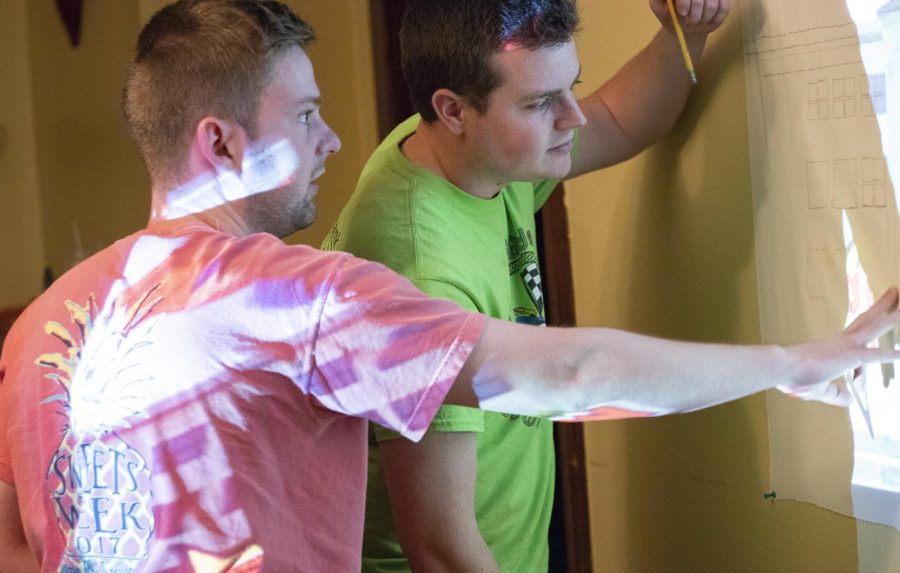Greek to me: A non-affiliate’s guide to Greek Week
April 23, 2019
What do a blood drive, synchronized dancing, can-made architecture and a muddy game of tug-of-war have in common? For one week each year, they are among the top priorities of WKU’s Greek population.
Monday marked the beginning of WKU’s 2019 Greek Week, a week of philanthropy and fun dedicated to bringing together the Greek organizations on campus. Each day holds a specific event, some of which are open to both Greek and non-Greek students.
“Greek Week is a series of events that show WKU and the Bowling Green community the WKU Greek community’s passion for leadership, service, scholarship and brotherhood and sisterhood,” Greek Week overall co-chair Kylie Schaefer said. “Greek Week occurs every spring and highlights the accomplishments and achievements of both fraternities and sororities.”
Monday kicked off the three-day-long blood drive, which invites Greek and non-Greek students, faculty and staff to donate to the Red Cross at the Preston Center from 10 a.m.-6 p.m.
Will Harris, vice president of judicial affairs for the Interfraternity Council and student body president-elect, said the blood drive is a way the WKU community comes together for a common cause.
“We usually have several hundreds that donate,” Harris said. “It’s a great way to give back to the Red Cross.”
Monday morning, each organization hung a banner it created in DSU. Banners follow each year’s theme, with this year’s being “Heroes on the Hill.”
Monday evening a faculty and staff appreciation dinner was hosted at the Augenstein Alumni Center. Each organization nominated and selected a faculty or staff member that made an impact on its members. This individual was honored at a free meal served by Greek students.
Tuesday continues the blood drive and features Greek Jeopardy, which will take place at 7 p.m. in the Downing Student Union auditorium. For this event, each organization puts forth one member who competes against the other organizations to answer questions about the founders, history and significant symbols not just of their own sorority or fraternity but of all organizations.
Wednesday will be the last day of the blood drive in the Preston Center.
Thursday is Events Day at 5 p.m. at Houchens-Smith Stadium, a carnival game day with competitions between teams put forward by each organization.
Friday holds one of Greek Week’s most popular events, TUG. This event starts at 2 p.m. at the WKU Agriculture and Research Farm.
“It’s a big mud pit where the teams kick holes into the ground and use it as their footing,” Harris said. “Instead of your typical tug-of-war where you’re standing up, they actually lay down in the mud and have the rope.
“It’s just a couple minutes, but it’s the longest couple minutes of your life.”
Spring Sing, another crowd-favorite event, will be held on Saturday. Spring Sing features a team from each organization that participates in a synchronized dance relating to the year’s theme where it is judged on aspects like the dance, vocals, set and costumes. Spring Sing is open to the public and will be held in Diddle Arena with doors opening at 5:30 p.m.
Saturday also marks the beginning of “Canstruct,” a philanthropy project where organizations host canned-food drives and then use the collected items to design and create specific structures.
The cans are then donated to local charities and food banks. In 2017, over 47,000 canned food items were donated.
Sunday wraps up the week with Greek Week Convocation in Diddle Arena. At this time, all organizations come together to celebrate not just their accomplishments from Greek Week but from the entire year.
Points are totaled from the week’s activities, such as how many participants were at the blood drive, what organization won the most events between Events Day, TUG and Spring Sing and which organization had the most cans and best design for Canstruct. The overall Greek Week winners are announced for both fraternities and sororities. Other awards are given out for work throughout the year such as the Karen Towel Award, Greek Member of the Year and other awards.
Harris said convocation is what demonstrates what the Greek community is trying to accomplish.
“We’ve spent the entire week with each other,” Harris said. “And we get together and celebrate what Greeks are trying to establish … Oftentimes Greek communities don’t really come together as a whole until Greek Week, but this is the one time where all of us truly get together, and it’s awesome to see everyone come together and celebrate the histories of our organizations and band together as a WKU family and community.”
Though the events only last a week, the planning started shortly after last year’s Greek Week ended when committees for the upcoming year were selected.
Schaefer and Ben Hopper, the co-Greek Week overall chairs, have been working on events since November.
“We lead a committee with 30 members and hold weekly meetings with this committee as well as weekly meetings with Greek chapter delegates,” Schaefer said. “Ben and I work closely with the director of Greek affairs and student activities as well as members of the WKU and Bowling Green community to help prepare for Greek Week.”
Schaefer said Greek Week involves a lot of help from committee members to make sure the events run smoothly.
“When it comes to Greek Week, there are a lot of moving parts,” Schaefer said. “We’re extremely fortunate to have a team of committee members that work diligently to make their event the best it can be.”
For fraternities and sororities, planning is only allowed to begin at the start of the spring semester. Organizations begin choosing their teams, creating ideas and talking strategies right when classes start.
For Kody Okert, who participates in both TUG and Spring Sing for his fraternity, Kappa Sigma, Greek Week preparations become an important part of a weekly routine. “Most TUG teams practice three
times a week,” Okert said. “I know we have really late practices, because it’s about the only time we can practice. As much as TUG practice can be the worst, they’re always fun. Especially those late-night practices where it’s just truck headlights lighting up the field and music playing in the background.”
Spring Sing groups practice about four times a week, also with late practices in order to make sure all members can be there. Choreographers begin working on routines at the beginning of the semester, and practices are in full swing shortly after. Event practices tend to be late, long
and secretive. Organizations work hard to keep their months of work under wraps in order to protect their ideas and keep competitions fair.
After months of preparation, Okert said he believes the organizations that participate in each event can be proud of what they’ve accomplished whether they take home the Greek Week plaque or not.
“Even if we don’t win, I think it goes a long way just to be able to organize and execute those events,” Okert said. “Just to be able to compete and see the work you’ve put in is great.”
Seeing the results of organizations’ hard work is one of the reasons individuals say Greek Week is so impactful to them.
“I have seen the impact that Greek life has on individual members, and I feel like Greek Week celebrates the success of our chapters and individuals in our community,” Hopper said.
Though the events celebrate the Greek community, Harris said he believes the support from the rest of the community is part of what makes the organizations and events thrive.
“Although it is Greek Week, these organizations and events are open to the general public,” Harris said. “It’s the WKU family and community that we thrive on.”
Features reporter Julie Sisler can be reached at 270-745-6291 and [email protected]. Follow Julie on social media at @julie_sisler.

























